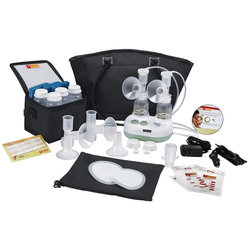If you’re a new mom and just happen to mention the word ‘breastfeeding’, there will be about ten people eager to jump at you with some advice or the other. It is okay to get a couple of tips from experienced and well-meaning family members and friends, but don’t believe everything you hear. Yes, there are plenty of breastfeeding myths being passed down from generations and you should know about them.
Myth#1: Breastfeeding always hurts
This is certainly not true. While it is natural to experience slight tenderness in the initial few days of breastfeeding, this is likely to be temporary. If you experience anything more than a mild pain or discomfort, then it is probably because the baby is unable to latch on correctly to your nipple. It might be a good idea to consult a lactation specialist if the nipple pain extends to more than a week. Another reason for pain could be a yeast infection in the nipples. You will not be able to prevent soreness by restricting feed. Discontinuing breastfeeding for healing should ideally be the last resort. However, if there is no such problem, that is, poor latching or yeast infection, there is no reason for you to experience pain while breastfeeding.
Myth#2: My baby isn’t getting sufficient milk if he/she is feeding a lot
This is yet another common breastfeeding myth. You need to understand that breast milk is easily digestible. It is not as heavy as cow’s milk or buffalo’s milk, normally consumed by human beings. This is why babies tend to feel hungrier sooner. This would not be the case if they were on formula feed. Hence, it is normal for a breastfeeding baby to demand milk after every 2 or 3 hours.
Myth#3: Small breasts cannot produce enough milk
As a new mom with small breasts, you need to know that breast size has nothing to do with milk production. The breast tissue required for nursing grows throughout the pregnancy and has no connection with the size of the breasts. The milk ducts which carry milk are located in this functional breast tissue and not the fatty tissue (responsible for the size of your breasts). So, don’t worry if your cup size is an A or D, your breasts will be able to produce sufficient milk to meet the baby’s requirements.
Myth#4: Nursing “rest” for the breasts will help produce more milk
Not really. The fact is that if you nurse more, you are likely to produce more milk. On the other hand, if you break your nursing schedule and decide to give your breasts a “rest”, it may actually lead to a reduction in the milk supply.
Myth#5: You should avoid nursing in case of a breast infection or a blocked duct
The exact opposite of this is actually true. Nursing is one of the best ways to unblock a duct. And once a blocked duct is treated, the infection will automatically get healed.
Don’t get dissuaded by these common breastfeeding myths. Every woman has a different breastfeeding experience and you should enjoy nursing your baby without too much stress!
Article Reviewed By Crystal Ibetoh MD, MBA reviews each article and ensures the accuracy of the health information. Dr. Ibetoh has strong medical interests in women's health and preventative medicine. She is also a mother of three and uses her medical expertise in addition to personal experience to provide advice about breastfeeding.
*The information provided on this site is intended for your general knowledge only and is not a substitute for professional medical advice or treatment. Please consult your healthcare provider with any questions or concerns you may have regarding breastfeeding.*

Both mother and child can reap numerous benefits from exclusive breastfeeding for the initial six months... Read More

Isn’t it everyone’s dream to burn all those calories while sitting comfortably on their lounge chair... Read More
